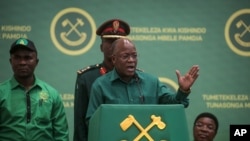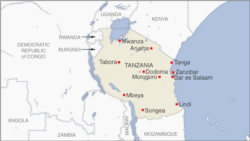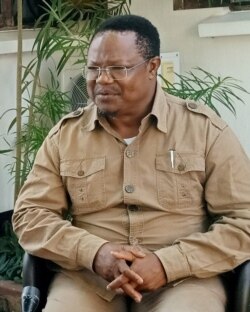Tanzanians go to the polls October 28, and President John Magufuli is expected to win re-election, despite a spirited challenge from opposition leader Tundu Lissu and accusations from rights groups that he suppresses individual freedoms and dissent.
Magufuli, 60, took office in November 2015 and is seeking another five years based on his economic record. A former public works minister, he extols his infrastructure projects and his administration’s success in raising Tanzanians’ gross national income. He represents the ruling Chama Cha Mapinduzi (CCM) party.
At least a dozen candidates are vying for the presidency, but the primary challenger is Lissu of the opposition Party for Democracy and Progress, known as Chadema. Lissu returned to the country in July after three years in Belgium, where he was recovering from a 2017 assassination attempt in Tanzania.
Voters also will choose legislators — 264 in Tanzania’s National Assembly and 50 in House of Representatives of the semiautonomous region of Zanzibar — as well as thousands of local government councilors.
The key issues in the campaign:
Political dissent: Critics of Magufuli’s administration accuse him of suppressing individual freedoms, political opponents and the press, and of narrowing the space for civil society groups. The government “has built up a formidable arsenal of laws to stifle all forms of dissent and effectively clamp down on the rights to freedom of expression and peaceful assembly” ahead of the vote, Amnesty International charged in a report this month.
Earlier this month, Lissu’s campaign was suspended for a week by the National Electoral Commission for allegedly using seditious language and other violations. The Chadema party called the charges unfair but agreed to the suspension.
Lissu, 52, says he would work to ensure rights, social justice and development in the East African country of 60 million.
COVID-19 and campaigning: Since campaigning began in late August, Tanzanians have attended huge political rallies without much masking or social distancing. The government stopped publicly updating coronavirus data in early May, when it reported 509 confirmed cases and 21 deaths. Health experts believe that’s now an undercount.
Magufuli, meanwhile, declared Tanzania virus-free in June. A devout Catholic, Magufuli says at campaign rallies that prayer has vanquished the virus.
In an interview with VOA, Lissu suggested he believes COVID-19 is still around but added, “Life goes on.”
Development: Tanzania has East Africa’s second-largest economy after Kenya's. Its growth over the last decade has continued under Magufuli, with per capita gross national income rising to $1,080 last year — enough to elevate Tanzania into the ranks of lower middle-income countries, the World Bank reported in July.
But because of a high birth rate, the actual number of poor people has grown to 14 million today – and many more live precariously close to the poverty line, the World Bank noted.
While Magufuli’s finance minister in June gave a sunny forecast of 5.5% GDP growth, the World Bank predicts it will drop to 2.5% because the pandemic has depressed the economy, including tourism.
Lissu has contended during campaigning that most Tanzanians’ living standards have not improved. He says he would invest in people, primarily by improving education and health systems, before spending on infrastructure. “If you cannot buy even your own food, goods roads do not matter,” Lissu has said repeatedly at rallies. “Development of things has to go hand in hand with the development of people.”
Lissu also says he intends to fight corruption and reform the criminal justice and land distribution systems.
For his part, Magufuli has positioned himself as an anti-corruption crusader.
"I hate thieves. … They have turned this nation into a poor country,” he said soon after taking office.
But the 2016 Media Services Act has “empowered the government to suspend and close media outlets for reporting on allegations of corruption and human rights violations,” the Associated Press reported earlier this month, citing Amnesty International.
Oasis of peace
Since gaining independence in 1961, Tanzania has been an oasis of peace in East and Central Africa. The country has sheltered refugees from the Democratic Republic of the Congo, Burundi, Rwanda and other neighbors, and it has served as principal peace mediator during times of trouble. Tanzania is a major player in the region, a founding member of the six-nation East African Community bloc.
The U.S. government reports it has appropriated nearly $548 million in aid to Tanzania for fiscal 2020. U.S. initiatives and programs support Tanzanians’ health, education, development and more, plus promote domestic and regional stability and democratic governance.
The website of the U.S. Embassy in Tanzania says the United States “reaffirms unequivocally” that it does not support any specific candidate or party in the country’s elections but instead supports the democratic process itself, including a genuinely free and fair election.
The Tanzanian National Electoral Commission's director of elections, Charles Wilson, told VOA that the vote would be transparent and credible.
This report originated in VOA’s Swahili Service.







